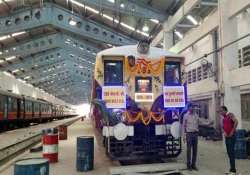End of an era: Mumbai’s Direct Current local is now a history
Mumbai: The Direct Current (DC) driven suburban local train plied for the last time on the Harbour Line on Saturday night as part of a special service run by the Central Railways from Kurla to

Mumbai: The Direct Current (DC) driven suburban local train plied for the last time on the Harbour Line on Saturday night as part of a special service run by the Central Railways from Kurla to CST where the historic ride was made available for Rs 10,000.
This special service was operated to mark the irreplaceable contribution of DC rakes in the suburban local operations.
This special train left Kurla at 11.30 on Sunday night and reached CST at 12.15 AM. It arrived in CST amid a shower of flowers and great pomp and show. People also got the opportunity to witness the 'live' conversion from 1,500 DC to 25,000 volt AC traction.
The iconic yellow-and-maroon direct current (DC) suburban local trains that served the metropolis for more than 90 years, started its first journey on February 3, 1925 when the first electric local ran between CST and Kurla on the Harbour line.
With plying of the first AC local train in Harbour Line on Sunday morning, the DC to AC conversion has been fully done in the Central Railway.
Meanwhile, the first air-conditioned suburban local train for Mumbai has arrived here, but it's not clear when it would be put in day-to-day operation.
The train is currently housed at Kurla car shed. First the AC rake will have to undergo number of tests and trial-runs before the Central Railways put it in the service for commuters.
Equipped with GPS and micro-processor-based software system, this 12-car local has a seating capacity of 1208 and standing capacity of 4936 passengers. 108 to 112 passengers can travel in a coach.
Built at the cost of Rs 54 crore, the train doesn't have first class and general class division; the entire rake would be vestibule-connected (in two parts of six coaches each) and can run at the top speed of 110 kmph.
AC local for Mumbai had been announced first in 2012-13 Rail Budget, but the project was delayed for several reasons.